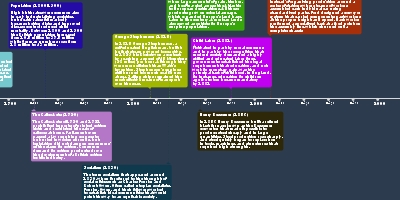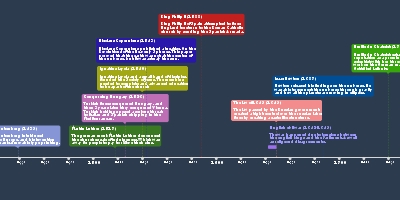Chaapter 30
Category: Otro
Actualizado: 2 ago 2021
Autores
Created byRishish Narahari
Attachments
Eventos
Battle of the Little Bighorn (1876)
Thousands of Lakota Sioux and their
allies annihilated an army under the
command of Colonel George Armstrong
Custer in the battle of the Little Bighorn.
Despite occasional successes in battle,
native Americans on the plains ultimately
lost the war against the forces of U.S.
expansionism.Texas Independence (1836)
Texas declared independence from
Mexico in 1836, largely because the
many U.S. migrants who had settled
ther wanted to run their own affairs.
In 1845 the United States accepted
Texas as a new state against vigorous
Mexican protest and moved to
onsolidate its hold on the territory.Abraham Lincoln (1860)
The election of Abraham Lincoln to
the presidency in 1860 was the spark
that ignited war between the states.
Lincoln was an explicitly sectional
candidate, was convinced that slavery
was immoral, and was committed to
free soilterritories without slavery.
Although slavery stood at the center
of the conflict, President Lincoln had
insisted from the beginning of the war
that his primary aim was the restoration
of the Union, not the abolition of slavery.Emancipation Proclamation (1863)
President Lincoln issued the Emancipation
Proclamation that freed the slaves in
those states that had rebelled. A looming
problem was that the slaves freed by
emancipation would have risked re-
enslavement after the war unless their
liberty was quickly reaffirmed. The solution
to this problem, one that Lincoln urged, was
the Thirteenth Amendment to the Constitution,
ratified in 1865, which completely abolished
slavery throughout the United States.War of 1812 (1812)
Ethnic divisions and political differences could
easily have splintered Canada, but the War of
1812 stimulated a sense of unity against an
external threat. The United States declared war
on Britain in retaliation for encroachments on
U.S. rights during the Napoleonic wars, and the
British colony of Canada formed one of the front
lines of the conflict. U.S. military leaders assumed
that they could easily invade and conquer Canada
to pressure their foes, however, Canadian forces
British North America Act of 1867 (1867)
The British North America Act of 1867
joined Quebec, Ontario, Nova Scotia,
and New Brunswick and recognized
them as the Dominion of Canada.
Other provinces joined the Dominion
later. Each province had its own seat
of government, provincial legislature,
and lieutenant governor representing
the British crown. The act created a
federal government headed by a
governor-general who acted as the
British representative.John A. Macdonald (1869)
John A. Macdonald negotiated the
purchase of the huge Northwest
Territories from the Hudson's Bay
Company in 1869, and he persuaded
Manitoba, British Columbia, and Prince
Edward Island to join the Dominion.
Macdonald believed, however, that
Canada's Dominion would remain
symbolic a mere "geographic expression,"
as he put it until the government took
concrete action to make Canadian unity
and independence a reality.California gold rush (1849)
Gold discoveries drew prospectors hoping to
make a quick fortune: the California gold rush
of 1849 drew the largest crowd, but Canadian
gold also lured migrants by the tens of thousands.Rail Road Strike (1877)
A nationwide, coordinated strike of rail
workers in 1877 shut down twothirds of
the nation's railroads. Violence stemming
from the strike took the lives of one hundred
people and resulted in ten million dollars'
worth of property damage. Nevertheless,
big business prevailed in its disputes with
workers during the nineteenth century,
often with support from federal or state
governments.Períodos
The Seven Years' War (1756 - 1763)
Originally colonized by trappers and
settlers from both Britain and France,
the colony of New France passed into
the British empire after the British
victory in the Seven Years' War



Comments